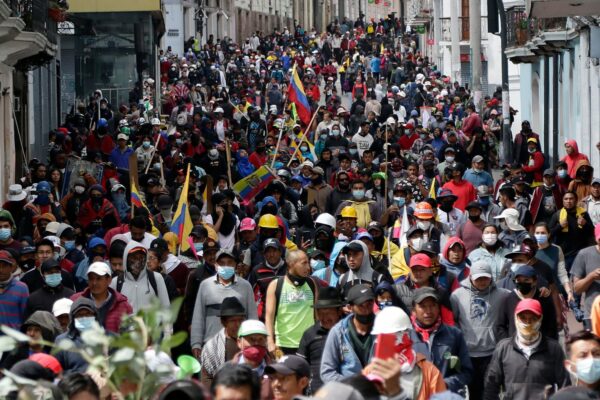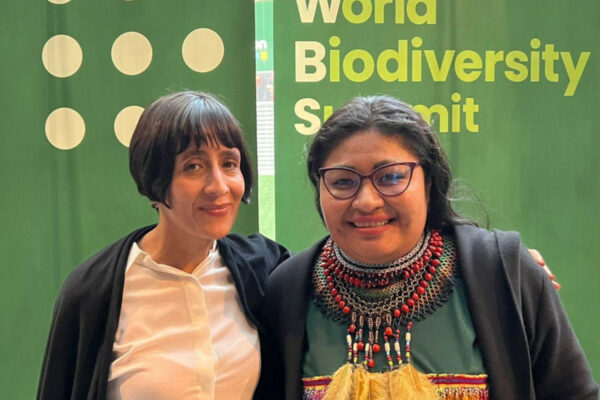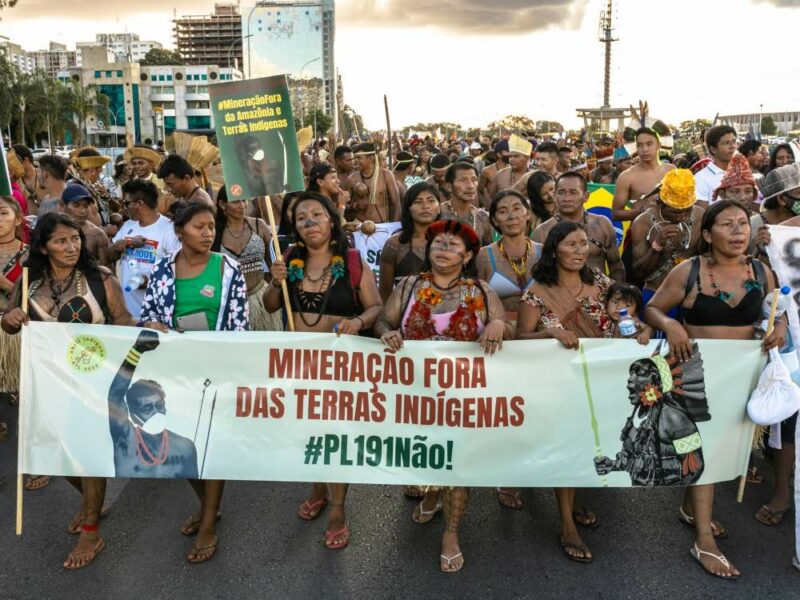It’s difficult to know what was more moving or arresting. There was the Ponca lady, Casey Camp-Horinek, starting to cry as she spoke about the impacts of hydraulic fracturing, or “fracking”, on her people in what she called “occupied” Oklahoma in the USA and saying “We’re having a funeral a week… We’re this close to being fracked to death.”
Then there was Kandi Mossett, from North Dakota, a fracking “victim who wasn’t able to come” and appeared on the projector and broke down too, telling how “these radioactive frack socks [that are] off the charts on the Geiger counters” are being dumped and found by children who say things like, “Hey, we’re catching bugs with our nets.” That was right after Shannon Biggs, the executive director of Movement Rights, had explained that fracking in the USA is destroying lives, livelihoods, groundwater, rivers, farms, prairies, communities and landscapes, as well as causing “earthquakes where earthquakes don’t exist” and poisoning “millions and millions and millions” of gallons of water that are “taken out of the hydrological cycle forever.”
“[Fracking] is a total and utter form of destruction,” said Biggs, who calls Mossett’s indigenous territory “the most intensive fracking site” in the USA. “You take land that is beautiful and full of life and vibrant with a dynamic sense of biodiversity, and we turn this landscape with fracking technology into waste land that is poisoned land [with] sick animals and sick human beings.”
Camp-Horinek and Biggs were speaking before the International Tribunal for the Rights of Nature which met in Lima, Peru, on Friday and Saturday. The objective was to investigate cases of possible violations of the Rights of Nature as laid out in the Universal Declaration of Rights of Mother Earth made in Bolivia in 2010.
In total 12 cases were heard, by 13 judges, with an Ecuadorian lawyer, Ramiro Avila, acting as “prosecutor for the earth” and numerous experts and impacted people from around the world called as witnesses. One such case was made against fracking for its impacts on “the subsoil of Mother Earth”, and another against “climate change caused by human activities” – just as the United Nations’ climate talks are being held elsewhere in Lima.
According to Pablo Solón, a Bolivian from Focus on the Global South, the rising and acidifying oceans, biodiversity loss, desertification, forest fires and increasing number of extreme weather events caused by global warming constitute a “systematic violation of Mother Earth’s” rights. Solón was joined by Nnimmo Bassey, from Nigeria, who said that “business as usual means cooking Africa” and cited statistics of 6 million people displaced by floods in Africa in 2012 and a projected 54% increase in African civil wars by 2030 as a result of climate change. Bassey showed photos of a fisherman returning from work, both feet black with oil, and who now sells firewood.
“He came back with nothing [that day],” Bassey told the Tribunal. “Livelihoods have been absolutely destroyed…[Oil brings] disregard for people, for culture, for life, for everything.”
The climate change case also included severe criticism of – and total opposition to – certain measures being considered and/or proposed by the UN, governments and companies as “solutions” to global warming. These were various geo-engineering technologies – described by Silvia Ribeiro from the ETC Group as a “very useful way” of avoiding addressing the fundamental causes of climate change – as well as “climate-smart agriculture” and carbon markets.
“[They’re] basically a mechanism to cheat,” said Mary Lou Malig, from the Global Forest Coalition, about the latter. “It’s about enabling you to pollute. Instead of cutting your emissions, you increase them and pretend to reduce by offsetting.”
Another case was made against “Reducing Emissions from Deforestation and Forest Degradation” (REDD) – a concept which involves paying those who ostensibly reduce emissions by supposedly keeping forests standing, depending on how much carbon is stored in them. Criticism was as much about the principles and philosophy behind REDD as how it works in practice.
Ninawa, an indigenous Kaxinawá man from Brazil, expressed concern about a REDD project in his home state, Acre, saying, “Nature has no price. It’s our forest, it’s our food, it’s our spirit.”
Ruth Nyambura, from the African Biodiversity Network, said that indigenous Sengwer people in Kenya are being evicted from their land and having their houses burnt by the Kenya Forest Service because of a REDD project funded by the World Bank, and called it a “new form of conservation” and “colonization.”
“This is not “management”, it is “government,” she said. “We must reject the financialization of nature. We must reject REDD definitely.”
Casandra Smithie went even further, citing a whole series of peoples who have struggled against, or have been threatened by, REDD and calling it a “crime against Mother Earth, Father Sky, and humanity.” The key perpetrators, she noted, such as the UN, the World Bank, extractive industries, multilateral banks, chemical companies, governments and stock exchanges, all have their headquarters in the industrialised northern countries.
“[REDD gives] permits to pollute,” Smithie told the Tribunal. “[It means] forests of the world acting as a sponge for northern industrial countries’ pollution. They can pollute if they grab forests in the global south.”
Other cases were made against “human activities” affecting the Great Barrier Reef in Australia, the BP Deepwater Horizon blowout’s impacts on the “sea and living beings” in the Gulf of Mexico, the Belo Monte dam in Brazil for its impacts on the Xingu and Amazon rivers, Chevron-Texaco for oil operations in the Ecuadorian Amazon, oil exploitation affecting four river basins in the Peruvian Amazon, oil operations in the far east of the Yasuní National Park in Ecuador, the Mirador mine in Ecuador, the Conga mine in Peru, and mining and oil operations in the Bagua region in Peru.
The UN climate talks, taking place elsewhere across Lima, came in for severe criticism at the Tribunal. Among other things, it was noted, by Malig, that agriculture isn’t up for negotiation, and that the UN is placing great hope in REDD – the “crime against humanity” which, according to Smithie, will be the “basis of the Paris accord”, i.e. the agreement for post-2020, when the Kyoto Protocol expires, that could be reached at next year’s UN climate talks in the French capital.
The Tribunal responded to the hearings by emitting one damning sentence including the verdict that BP and both the Australian and Ecuadorian governments have violated the Rights of Nature, and by issuing a series of orders. These include that BP should abstain from any future deepwater exploration, that Australia should restrict tourism involving the Great Barrier Reef, that Ecuador should suspend Mirador and restore the impacted area, and that Chevron should comply with Ecuadorian court orders to restore damaged areas in the Amazon and pay financial compensation – a ruling that Chevron argued had been reached by fraud and racketeering and which it challenged by filing suit against the Ecuadorian plaintiffs and their lawyers.
The Tribunal’s sentence also acknowledged statements made by Camp-Horinek and Patricia Gualinga, a Kichwa woman from Ecuador, about how the earth is a “living being” on which “all other living beings depend” and that it has a right to life, to respect, and to be consulted.













